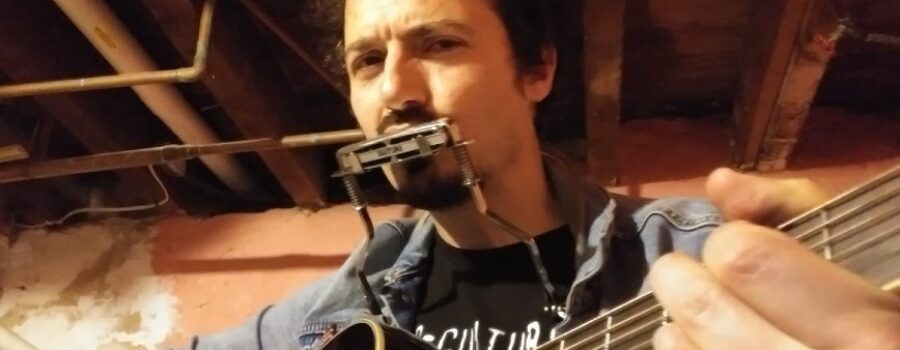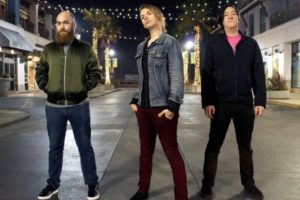There isn’t a Boomer who hasn’t uttered, “If you love what you do, you’ll never work a day in your life,” or some version of that but aside from Boomers screwing up the world for most, they’re right about that. Having a passion for what you do is key to wanting to wake up every day and making it through those days with a smile on your face. It’s a concept that’s easier said than done for many, but for Matthew William Charles, he’s doing his best to live that life…which is likely why his 2020 release is ‘Love What You Do.’ We talked about just that, the record at hand, and I even introduced him to the world of ‘Sex and the City’ in this back and forth between creatives.
Kendra: Noting the release date of ‘Love What You Do,’ it seems like a lifetime has passed. March 2020. Looking back, were you like many in thinking that the pandemic wasn’t going to last this long and that you’d be out playing by summer?
Matthew William Charles: Yes absolutely, I thought that I was going to be out and playing by summertime when the pandemic first hit. A good portion of my summer had already been planned out. I had a UK tour lined up for July, tickets purchased, and shows booked. I was planning a small music festival for August in Philadelphia, PA. I had planned the release of “Love What You Do” to coincide with a couple of tours that I had scheduled for March and April. It was a day by day realization. Every week there were more and more cancellations. I had held on to hope until the last minute in most cases, not wanting to deal with the airline and car rental cancellations, and ultimately the disappointment of not getting to do what I love most, which is traveling and playing music. It was going to be an awesome summer for live music, needless to say, I was bummed out, but I dealt with the situation the best that I could.
Kendra: One thing I have admired about artists this year is their ability to keep pushing forward and finding ways to make their presence known in new ways. How do you feel these adaptations made this year will affect musicians in the coming years? Do you feel like we could be in for some sort of major shift in the industry as a whole because of 2020?
Matthew William Charles: Yes, it is interesting how musicians are adapting to the current situation. What I’ve seen is that many of us are becoming great at putting together online content. Many musicians that I know personally started live streaming performances for the first time at the start of the pandemic and have now set up mini studios and have been putting together really good quality live content.
In the future, It would be great to see people combine live-streamed concerts with actual live shows with people in attendance. I think it would be great to have an option for people who want to attend a live show but can’t, but still could watch the live stream from their home. Maybe they wouldn’t have to pay as much as the live ticket but could pay a lesser amount or contribute to a virtual tip jar for the musicians. As far as the music industry as a whole it’s hard to say, it has already changed so much in the last several years as far as how people consume music. I still prefer purchasing records, CDs, and tapes from bands after a live performance. I don’t think that you will ever be able to replace that experience, but I think the shift to a more digital music world is inevitable.
Kendra: Speaking of admiration, ‘Love What You Do’ is a great title and life mantra to have. Was music what you’ve always done or were you in another career and finally realized, nah…not for me?
Matthew William Charles: I had wanted to be in a band since I was a little kid, and I finally got my first band together when I was 15-years-old. I started playing shows at the local youth center, and in a couple of years, I was booking my shows at local bars and venues. I’ve always had a passion for music and have found a way to fund and maintain my habit. In other words, I’ve always had a job. I’m a working-class musician; get off of work and go to band practice, or drive straight to the show, get home at 2 am and wake up in a couple of hours to go back to work. I’ve always found jobs that would be flexible and let me tour, and if they said I couldn’t go on tour I would quit and find another job when I got back.
These past several years I’ve started my own screen printing business here in Philadelphia, PA. I make band merch for a living, and I can take time off for music whenever I want. It’s a lot of hard work and dedication but it’s rewarding. I’ve always had a do it yourself mentality and one of my main goals in life was to be in a position where nobody was able to tell me what to do.
Kendra: There are a lot of styles going on on this record, but the base seems to have a punk spirit. Did you grow up with that punk mentality, going to the likes of Warped Tour?
Matthew William Charles: I discovered punk music when I was in my early teens and it changed the trajectory of my life. I grew up with a lot of different influences, but when I heard bands like Black Flag and The Descendents it changed my perception of what a song could be. I didn’t realize that you could write songs that could hit you like a blunt object, intimately describing whatever personal angst and general unhappiness that you might have. That influence has followed me every step of the way through my various musical progressions. Looking back, surprisingly I only made it to one Warped Tour back in 98’, but I was never a really big fan of festivals and preferred the more intimate setting of a local venue.
Kendra: Anyone in a creative career can attest to “Living in Debt.” Despite what Carrie Bradshaw was pimping, freelance doesn’t allot every writer to live in Manhattan. What do you feel aspiring musicians should know about the financial side of making music before they jump in?
Matthew William Charles: Full disclosure I just had to look up to see who Carrie Bradshaw was, and seeing that she was part of the HBO series ‘Sex And The City’ I can understand why I don’t. Also “Living In Debt” is specifically about the problems associated with college debt, but I can see how that can be applied to musicians.
Before I could give any financial advice, I would first ask yourself,” Why do you want to play music?” The answer for me and I can only imagine this is the answer for most people is that you love music, you enjoy the way it makes you feel, or that you enjoy performing for people and being on stage. You can’t forget the reasons why you started. Being a career musician is hard, and most musicians have jobs or some sort of side gig to make ends meet. The percentage of musicians who make a lot of money is really small, but those people are most likely working all the time and many become physically and mentally drained. Financially, you need to have realistic expectations. You need to make a plan, plot out goals and understand what you need to do to make those things happen. You need to live within your means, many times that means living uncomfortably so you have more time and money to invest in your music. When you start, if you make money, save it. Put it in a bank account or some lockbox that you will not touch even in an emergency. Only reinvest that money into your musical project. If you’re going that extra mile to become a career musician you have to think about your music as a business. That doesn’t work for a lot of people because it sanitizes the experience. Again you have to ask yourself those important questions to figure out what is going to work for you.
Kendra: With all that has transpired this year, how do you feel 2020 has shaped your creativity and drive moving forward?
Matthew William Charles: 2020 has been a huge reality check. It’s made me realize, even more so than ever that I can’t take anything for granted. My drive is the same, and I’m going to continue to be positive and write music and try and share my music with as many people as possible. The landscape has changed and I’m trying to adapt the best that I can. Nothing can replace live shows, interacting with people face to face, and making new friends and fans. The silver lining is that I can learn some new ways to share and promote my music, and hopefully, if things return to normal I can use those new techniques in tandem with traditional touring and live performances.
Kendra: Usually, this is where I ask people what they have planned in the coming months but with the world in a strange place right now, plans aren’t as concrete as they typically are. You can go ahead and let us know what you have tentatively planned but can you also share a song that never fails to get you through when the world around you feels like a mess?
Matthew William Charles: It has been a struggle to make plans and be productive. I’m currently working on some home recording projects and I plan to release some of those songs periodically over the next several months. I’m working on making some music videos and I have been making more use of my video streaming accounts like YouTube and LBRY. I’ve done some live streaming events and plan to do some more in the future, it’s honestly not my favorite thing but it helps fill the void.
A song that never fails to inspire me and gets me through tough times is “Superhuman Coliseum” by the band I Farm. It’s an obscure, thrashy punk rock track off their album, ‘Sincerely Robots.’ The main refrain is “Live again, and start all over ” which I think is a good piece of advice, if not a necessary action if our world continues on its current course.






